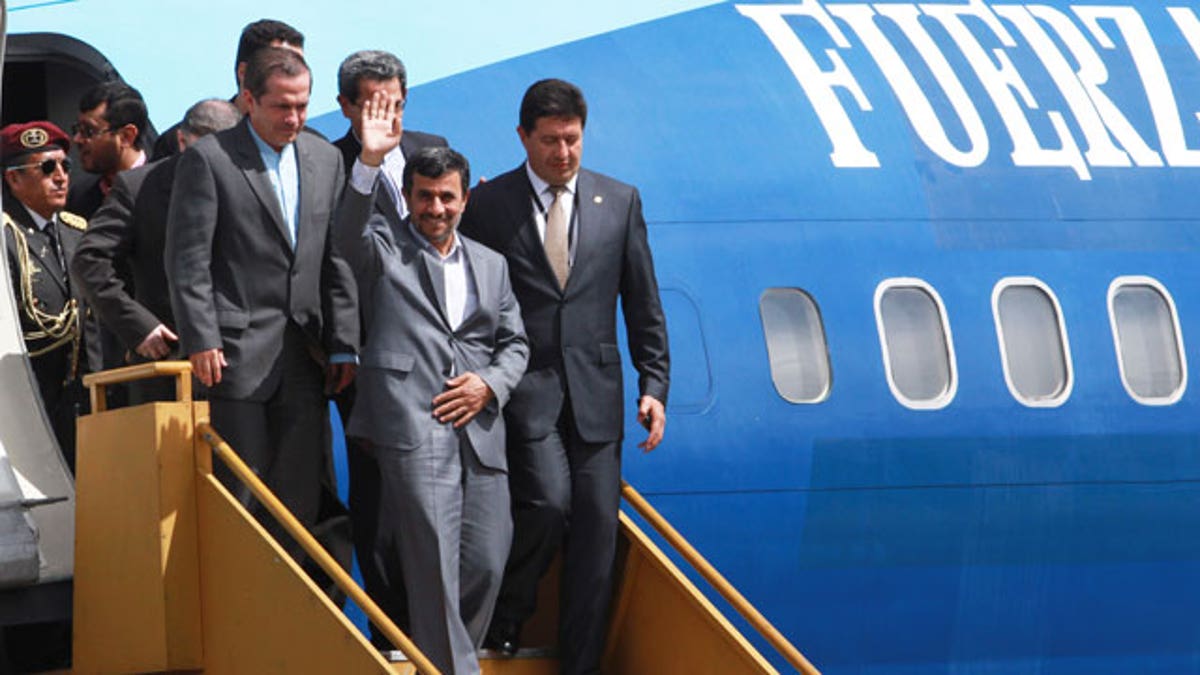
January, 12, 2012: Iran's President Mahmoud Ahmadinejad waves as he exits a plane upon arrival to an air force base in Quito, Ecuador.
WASHINGTON – Iran has agreed to host a high-level team of United Nations nuclear inspectors later this month, according to Western diplomats.
The surprise development could help to curb building tensions with the West, The Wall Street Journal reported.
However, the U.S. warned Tehran against making good on its threats to close the Strait of Hormuz -- a strategic waterway where 20 percent of the world's daily oil trade passes through -- The New York Times reported, adding that the Obama administration would consider such a move a "red line" and would respond accordingly.
The warning came as diplomats Thursday said Iran had tentatively agreed to receive a delegation from the United Nations' International Atomic Energy Agency (IAEA) headed by the agency's chief weapons inspector, Herman Nackaerts, The Journal reported.
The diplomats, who are based in Vienna, said the visit was tentatively set for Jan. 28. Unclear, said the diplomats, was whether Tehran would let the inspectors visit key nuclear sites and interview the Iranian official the U.S. and the U.N. agency believe may head a nuclear weapons program.
An Iranian diplomat in New York declined to comment to The Journal on the trip.
Fears of a conflict between Iran and the West have soared in recent weeks as the Obama administration and European Union began enacting sanctions targeting Tehran's oil exports and its central bank in a bid to persuade it to halt its nuclear program.
On Thursday, the U.S. raised pressure by sanctioned firms from China, Singapore and the United Arab Emirates for doing business with Iran's energy sector, the State Department said.
Iran has responded by threatening to choke off oil commerce through the strategic Strait of Hormuz. Tensions rose further this week when Iran sentenced a U.S. Marine to death as a spy and an unidentified assassin killed an Iranian nuclear scientist in Tehran.
Senior U.S. officials have in recent days warned of the consequences of the strait's closure, with Chairman of the Joint Chiefs of Staff Gen. Martin E. Dempsey saying that Washington would "take action and reopen the strait," the New York Times reported, adding that doing so could involve the use of airstrikes and warship escorts.
While Iran's threats are widely-regarded as an attempt to increase the price of oil, and the strait's closure is seen as unlikely, the Pentagon says Tehran has the military capability to shut down the waterway.
"The simple answer is yes, they can block it," Dempsey said on CBS on Sunday.
However, Iran's navy is not considered to be a match for the U.S. Navy. Even though it could inflict damage on U.S. naval forces, the Iranian navy would eventually be defeated, according to naval analysts, who also said that reopening the strait could take anything from one day to several months.
